Nikki Guerrero moved to Portland in 1999 to escape the heat of Arizona and Southern California. Pretty quickly, she found that the city’s salsa game was lacking. So, she dug through her family recipes and started making her own.
A friend, also an Arizona transplant, owned a small neighborhood market in North Portland and encouraged Guerrero to make her salsa and homemade tortilla chips for the store.
Guerrero obliged. From there, she began selling at Farmers’ Markets, dialing in the spice levels to better suit the tastes of Pacific Northwest consumers. By 2008, she had a business, Hot Mama Salsa, that received a lift from a support system that was coalescing around a growing number of Portland-based food and beverage product startups.
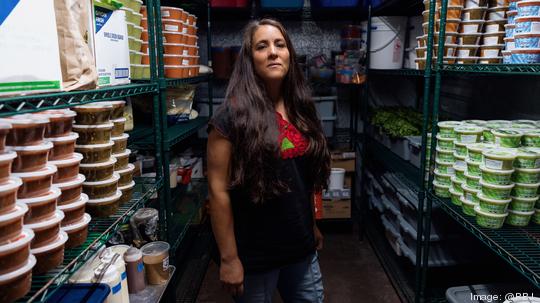
That ecosystem has only strengthened since, anchored in large part by two Oregon-based grocery chains: New Seasons Market and Market of Choice. Both run programs that offer entrepreneurs not only shelf space, but a sandbox in which to learn the ropes of the complex and hyper-competitive grocery business. The hope is that the skills gained and relationships forged will propel local and small-batch producers toward national distribution.
New Seasons and Market of Choice are among the chains that carry Guerrero’s Hot Mama Salsa, which all told is sold in 115 stores.
Makers and those that support them say the resources the local markets provide is critical, especially now. Even in good times, just 15% of food and beverage makers survive more than four years, said Shannon Hiller-Webb, principal of Prosparus, a food and beverage-focused business consultancy. These days startups are dealing with the added stressors of inflation and a volatile economy that threatens to put higher priced, locally crafted products out of reach for many consumers.
“We’ve been seeing a lot of companies die lately,” said Hiller-Webb, who co-founded Green Zebra Grocery and previously worked at New Seasons. “With the supply chain challenges and inflation combined, companies that had a healthy margin to go into the market have seen their margins constricted to the point where there are no profits.”
Junea Rocha, co-founder of the Portland-based Brazilian cheese bread maker Brazi Bites, said she's seen some input costs rise 50%. New Seasons was one of her early partners after founding the company in 2010. Today, Brazi Bites is sold in 16,000 stores across the country.
"Now it’s more important than ever having the support of New Seasons and Market of Choice in this local ecosystem to help emerging brands navigate these times," said Rocha. "All the groups are holding hands to make sure we can navigate. It is not going to be like this forever. We will emerge and we will want new products and an ecosystem that is healthy.”
What do these local retailers do
Guerrero began focusing full time on Hot Mama Salsa in 2012, the year her daughter started preschool. Over the years, she's added hot sauces, chili oil and tortilla chips to her product lineup. Her fresh salsa is still a best-seller, moving 2,000 units a week. She said her tortilla chips, a newer addition, were recently the No. 2 best-selling item at Zupan's Market on Burnside.
The success is sweet, but Guerrero has cleared plenty of hurdles to get here. New Seasons, which operates 19 stores in three states, was an early target, but it was tough to break in. Buyers were hard to reach and her inquiries went nowhere. That is until New Seasons formalized its Local Finds program in 2014.
See also:
Local Finds helps local vendors get in front of buyers. In its earliest format, small-batch producers could drop off items for buyers to try in boxes at New Seasons' customer service counter. Today, the drop-off boxes have given way to a website, where local vendors can create a profile and send samples to the store.
“(The program) encourages more producers because there is a place to sell (products), which is key,” said Lori Hunter, who runs Local Finds. “There is a lot of small batch production in places like Brooklyn (New York), but there is no outlet for selling. Then you see a lot of e-commerce which defeats the whole purpose of a local food economy.”
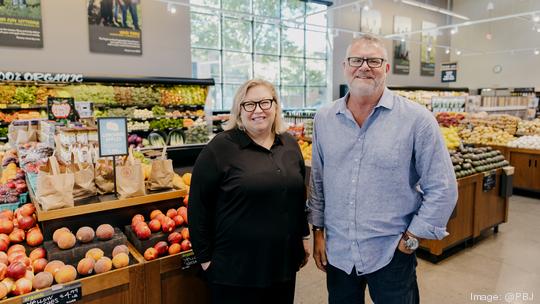
Hunter and Chris Tjersland, director of brand strategy and development at New Seasons, work directly with the producers making introductions and offering guidance on how to get products into retail channels. Roughly 250 to 300 vendors have participated in Local Finds.
The connections have helped keep some food and beverage producers afloat during Covid, and helped the retailer keep shelves stocked when broken supply chains prevented many products from making it to store shelves nationwide, Hunter said.
The retailer also supports local vendors through its private label program called Partner Brand. Eighty percent of Partner Brand products are made by local vendors. One percent of private label sales then go into a fund that offers $5,000 to $25,000 loans to help local vendors scale.
Affouet Price is founder of beverage maker Hibisbloom. She has been selling her product in New Seasons since 2020. Earlier this year, she received one of the New Season’s Partner Loans for $25,000, which she used to transition her packaging from glass bottles to aluminum cans.
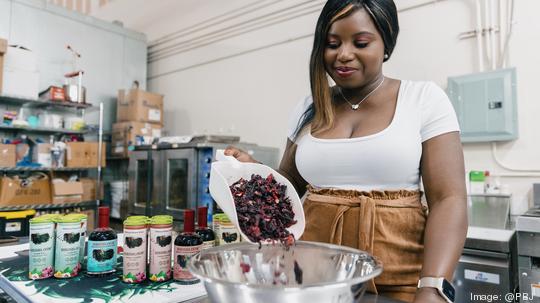
“It was the friendliest loan to finance the project,” she said. “It’s the best thing that happened to me this year, with the pandemic and inflation (challenges).”
New Seasons has made $288,000 in loans since the fund launched in 2019.
Market of Choice has made a similar commitment to support local producers. The Eugene-based retailer with 11 Oregon stores, is family run and local sourcing has long been the heart of the operation, said John Boyle, chief merchandising and marketing officer.
“I tell my buyers we have an obligation to do our part supporting these local producers and helping them get to market,” Boyle said.
That includes offering up shelf space, helping entrepreneurs with packaging or brand and marketing resources, even connecting them with other resources such as the PCC Get Your Recipe to Market, the OSU Food Innovation Center or Oregon Entrepreneurs Network.
“We have what we call the full potential promise,” said Boyle, who also spent two years leading merchandising at New Seasons. “That basically means you can get into one of our stores or all 11 of our stores. And if you want, I’ll introduce you to Chris or Lori (at New Seasons) or I’ll introduce you to the folks at Barbur World Foods. We want to not just be a retailer but a resource.”
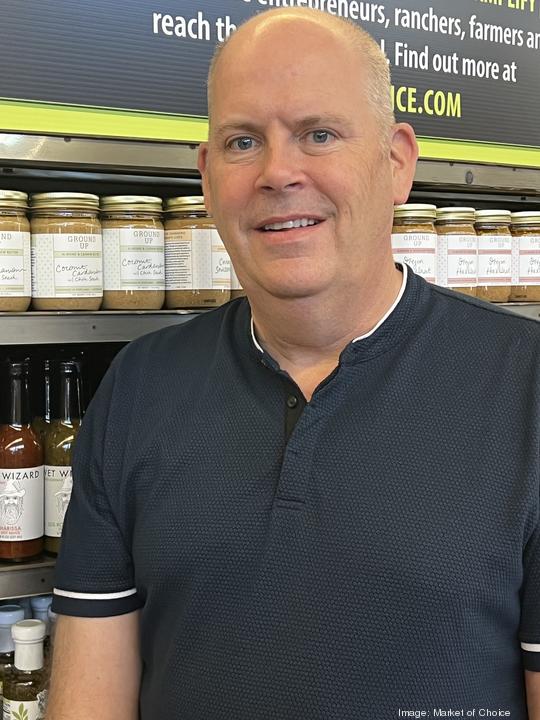
New vendors launch in-store at Market of Choice the first week of each month. About 200 local producers have landed on the market's shelves since 2020.
The grocer runs two programs to support local producers. The MOJO Program has provided, guidance, targeted funding, distribution assistance and other services to roughly 500 local food and beverage makers, said Boyle. The Amplify Program, according to the Market of Choice website, lifts up BIPOC, LGBTQIA+ and women makers by spotlighting their products with "colorful icons and shelf tags."
One other notable benefit offered by both Market of Choice and New Seasons is the opportunity for small-batch makers to drop off products at one location for delivery to several stores. As consultant Hiller-Webb noted, just getting products to stores can be a considerable drain on the time and resources of an entrepreneur.
What it means to small businesses
The grocery business is complicated, with loads of regulations and costs that can take inexperienced vendors by surprise.
Like product size. If your containers are too tall to fit on a standard store shelf, you could well lose that spot. There are stringent food labeling requirements and safety certifications that can take up to six months and cost $6,000 to $10,000.
Those sale items? That price difference is typically absorbed by the brand, not the store. And if a product doesn’t sell, the brand, in most cases, must buy it back in what's known as a buy back. A grocer might even demand free products from a new brand to see how the product moves.
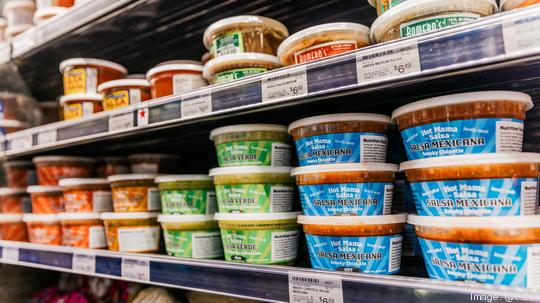
Guerrero made several unconventional decisions when she launched Hot Mama Salsa. She decided not to use preservatives, so her salsa would be fresh. She didn't hire a broker or a distributor, figuring they would just eat into her margins. She didn't give away free product and she didn't do buy backs.
“Because these local grocery stores were willing to support small local businesses, I was able to say, hey, look, we’re a small business, we can’t afford to do those things, but here is what we will do,” Guerrero said about working with local grocers.
New Seasons served as a proving ground, one that allowed other retailers to see that Hot Mama Salsa had "velocity," a key metric for grocers into how quickly products move.
Hiller-Webb said Market of Choice will discount some locally made items, without passing the cost onto the brand, to encourage consumers to try the products.
“Then (the brand) can have velocity in the (grocery data) reporting to get into new accounts,” she said.
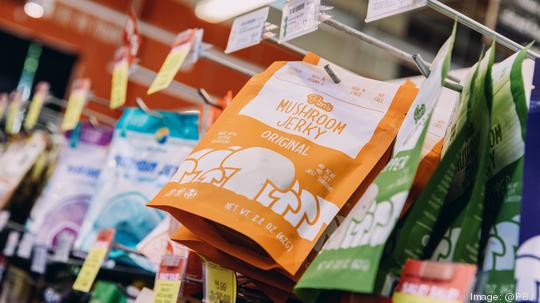
Why a tight community is important in tough times
The secret sauce that makes Portland's food and beverage ecosystem unique may well be collaboration.
“It’s incredible that everyone is into collaborating and lifting each other up,” said Guerrero, who now has 10 employees. “It’s part of why I wanted to start a business here. When I moved up here, I felt this supportive community vibe.”
The community itself is being tested as food and beverage makers work to recover from pandemic disruptions and now face, in some cases, an existential threat in inflation.
Hannah Kullberg co-founded the packaged food company Better Bean in Portland with her father, Keith, in 2009. Now she is starting a co-packing business designed to work with small brands and those with culturally specific production needs. Kullberg, who also works as a consultant, administers a peer resources group that includes 700 local makers, including Hot Mama's Guerrero.
Kullberg said some members have shared in group emails that they are shuttering their businesses and selling off equipment; Many others are on the brink.
“Some can’t get the capital to make it make sense anymore,” Kullberg said. “At the small volumes the price point won’t work. Or they are running out of cash flow.”
Ingredient and packaging costs are soaring, said New Season's Tjersland. It's an issue New Seasons, Market of Choice and Built Oregon, which supports small businesses through an array of programs, are working to address.
One idea is to use the bulk buying power that the two retailers have for packaging material. The grocers could buy packaging material in bulk and pass the savings on to the vendors, Tjersland said. So instead of packaging increasing 25%, maybe it only rises 5%.
Another thought is that small-batch makers could share a sales or marketing person, said Market of Choice's Boyle.
The cooperation of the competing grocers extends beyond strengthening the food and beverage ecosystem. After wildfires devastated parts of Oregon in recent years, New Seasons, Market of Choice, Built Oregon and others connected with impacted farmers and food manufacturers within 48 hours to offer up commercial space, cold storage and other resources.
“We are moving from a mindset of scarcity, like you are stealing my client, or customer or vendor to (a mindset) of collaboration, like the stronger they are, the stronger we all are,” Kullberg said.
Size matters, too. In this case, the small town feel of Portland, Eugene and other Oregon cities. Boyle, who has worked at larger grocers in other parts of the country, said people in the industry know one another. He previously worked at New Seasons, so did the grocery consultant Hiller-Webb. Those personal relationships encourage collaboration.
“At our level, competition is not as cutthroat as people think. It’s way more competitive when you get past us to other players,” Boyle said. “Our philosophy is that it’s very important that we focus on a local, regional supply chain. We saw what happen during the pandemic. We weren’t as affected because we kept sourcing close. We have champions like Market of Choice and New Seasons not just working locally but talking to the Oregon Department of Agriculture and incubator groups to keep the supply chain local.”



